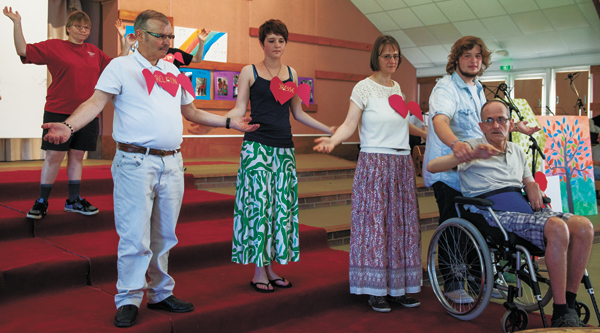(Editor’s note: This is the second in a series of excerpts from an interview with Pacem in Terris Award recipient Jean Vanier at his home in Trosly-Breuil, France, on July 7. Vanier is the “beginner” of L’Arche, an international federation of communities where people with and without intellectual disabilities share life together. Vanier spoke with Catholic Messenger Editor Barb Arland-Fye just before receiving the Pacem in Terris Award from Bishop Martin Amos.)

Catholic Messenger: You invited two men with intellectual disabilities who had been living in an institution to live with you. How long did they stay with you?
Vanier: The first one who left, Raphael (Simi), went on weekends to a community of ours about 50 kilometers away. Then he said, I’d like to stay there, because L’Arche was getting big and (the place Raphael moved to) would have been a little village. Actually, he lived with George for a long time. (George Durner, recently retired director of formation for L’Arche International, was community leader of L’Arche of La Rose des Vents when he and Raphael lived together. Raphael died in 2003). Then the other, Philippe (Seux), stayed … about 15 years. Now he’s in a community in Compiegne … You’ll probably see him here this afternoon.
Catholic Messenger: Is it hard when members go to a different house? How is that decided?
Vanier: First of all there has to be a place, and (a desire to move). In my home at the moment there’s a girl who’s been in the house about 30 years. My home is quite big, myself and 12 people. Reflecting with her, she thought that maybe a smaller community would be better. So she went for a week to a smaller house, and then she said she’d like to stay. It’s a combination of room in a house, reflection with others and, eventually, a choice. Nobody would change unless there’s a choice.
Catholic Messenger: When did you start going “co-ed?”
Vanier: The actual living together … probably around ’72 or ’73, though I would say the workshops would have been earlier.
Catholic Messenger: How did the workshops come about?
Vanier: The workshops came about because the institution of which (his spiritual mentor, Father Thomas Philippe) was chaplain was here in the village. … All the staff (of the institution) resigned … I was asked to take over. I found myself not only the beginner of little L’Arche — but also the (leader) over 30 or 35 people, and they had a workshop.
Catholic Messenger: In the early, years, how did you decide when to begin a new L’Arche community?
Vanier: There was a couple from Canada. They spent a year here. They were Anglicans. After spending a year here, they did a course in ecumenical studies in Switzerland and then left for Canada with the idea of starting a community in Canada. I gave a retreat in Canada in 1968 to priests, religious, lay people. At that retreat was a superior of a religious order. She said, “you know we’re not using our novitiate and we could give it to you.” We were given the novitiate with a huge land. That’s how (L’Arche community) Day Break was formed…. Many of the communities began through retreats. Though, the community in Africa began because we had a community in India, a community in Haiti, a community in Canada and Honduras. We felt that something should be done in Africa … there were some real signs to go to Africa … they were mainly signs of God.
Catholic Messenger: Do you remember much about the start of L’Arche in Clinton? I understand Sr. Marjorie Wisor (a Sister of St. Francis of Clinton, Iowa) came and heard you talk in France?
Vanier: She spent maybe a year here…. She had obviously connections with her religious order … I remember her well.
Catholic Messenger: How many assistants did you begin with? When you started your first house, were you by yourself?
Vanier: A friend of mine came for a week, and then on the 22nd of August somebody came; though, the person who was here for a week left and I was there for a few days alone … people started coming (to assist).
Catholic Messenger: So God really provided, didn’t he?
Vanier: That’s the story here. In France today, all our communities, there are 300 volunteers who come for a year. And some of them stay for a second year, but then who’s going to come next year? … You need quite a high proportion of people being here, but you can’t give salaries to everybody. Here in a home (foyer) with around seven or eight people there would be two people with salaries. But, to create a home is more than that. (For) a joyful home and a place of freedom and happiness you need probably another two or three people who are volunteers who come for a year. That means people that we want to be competent and have to be helped and have to be formed.
Catholic Messenger: So they’re in formation?
Vanier: There’s a lot of formation here.… Year by year, assistants who are really good move on. Heads of houses move on. That is part of our fragility, our weakness. We live with weak people and we are weak. It means we are dependent and in need.







